SUMMARY
This is AI generated summarization, which may have errors. For context, always refer to the full article.
![[OPINION] UP’s Kobe Paras and the struggles of American life](https://www.rappler.com/tachyon/r3-assets/612F469A6EA84F6BAE882D2B94A4B421/img/422E7218B1B745AD9FFC0CAA6C7CE3D4/imho.jpg)
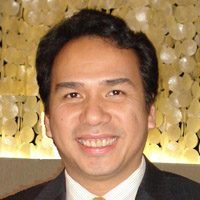
UP men’s basketball player Kobe Paras scores a lot of points as a new recruit of the State University. He also scored a lot of salient points which resonated with Filipinos the world over.
It is UAAP season once again and the UP Fighting Maroons are roaring. Old, reliable faces like Bright Akhuetie, the De Liano brothers, and Manzo still grace the court. However, new player Kobe Paras is the lightning rod who can pave the way for the State U to reach the Final Four and possibly win the championship.
Paras’s collegiate basketball history is a story in itself. He is someone who struggled in the American environment, just like how Filipino OFWs/immigrants struggle in the US and practically the rest of the world.
Paras recently gave an interview after UP’s gallant overtime win over Adamson University. He emphasized several relevant points. As an OFW in the East Coast, I immediately found common ground with his 3-year predicament in the West Coast. The way he described his US life is what the vast majority of OFWs/immigrants experience: unending challenges, isolation, despair, hope, trials, momentary success, and seizing of the few available opportunities.
Fourth college and third chance
Paras said “This is my fourth college so I’m just thankful for coach Bo [Perasol] and the whole UP community for giving me basically a third chance not just in basketball, but in life.”
He was in 3 West Coast colleges in quick succession: UCLA, Creighton, and Cal State Northridge. After signing up with UCLA, he withdrew and signed up with Creighton but only lasted one season. He transferred to Cal State Northridge but was not able to play a single game. He then tried pursuing a pro career but that didn’t pan out, forcing him to come home.
Though we commiserate with his unfortunate turn of events Stateside, it was all a blessing Philippine-side. I remember back in late 2017, I was watching YouTube videos of Kobe playing 3-on-3 or joining dunking contests in the US. Now he is suited up for the UP Maroons, giving the State U a competitive chance at entering the Final Four and beyond. (READ: Kobe Paras on the PH: ‘I just wanna make everyone here proud’)
He was quick to admit that UP is his fourth college. This is a point I can readily relate to. I only have one college alma mater (UP Diliman) but have had to travel to and live in two countries to attain 3 masters of law (LLMs). It’s a long and complicated story but each degree opened up career and visa opportunities in the adopted country at the time. My last masters/LLM, which focused on taxation at Georgetown Law School, was so instrumental in my career that it allowed me to get out of litigation and enter larger renowned organizations for corporate work. (READ: Kobe Paras thanks UP for ‘third chance’ after long-awaited debut)
Some people just need a third opportunity to get where they need to be – like how Paras needed a fourth college and a third chance. Other OFWs/immigrants need a third career, a third opportunity, a third round of funding, a third business, a third gamble, a third country, a third job transfer, a third boss, or a third take on the New York Bar, USMLE, or NCLEX. It’s difficult, but it’s part of the grit needed to thrive abroad.
Adversities and limited opportunities
Paras mentioned that he has long been facing adversities and limited opportunities: “I’m trying to be passionate about the game, because when I was in the States, I didn’t really get to play in college, and it really hurts.” Yes, it hurts. Facing limited opportunity abroad really hurts.
I know of many Filipinos, even UP graduates, who are unfortunately underemployed, meaning that the work they perform are below their skills and academic qualifications. Yet they remain in those jobs because there is not much choice out there.
I know of a UP graduate doing mere clerical work in a big accounting firm while the spouse performs recordkeeping work in the same firm. Not really bad; they’re able to provide food on the table, and it’s nothing illegal. Then again, if they were in the Philippines, they’d probably be government directors by now. There are many well-qualified Filipinos doing manual, repetitive, administrative work. But usually it’s for good pay and benefits, and at the end of the day, that’s what really counts.
Being overqualified hurts. But it takes a mountainous effort to get to the next level and not all are prepared to make that jump. Further academic qualifications, among others, help prepare for that jump.
Mental health issues, alone and homesick
Paras commented that he was alone in most of his struggles in these US colleges. He said: “A lot of people think it’s easy being alone in the States. I had to go through a lot of mental issues.” This is possibly because he was facing complicated life issues alone and at a young age. It is hard to fathom what exact mental issues he faced but one can deduce that his long and difficult search for a US college that will appreciate his basketball skills (and allow him substantial playing time) took its toll.
It’s hard to be crudely regarded as a bench player when you know you have the ability to be a superior player. That’s what many underemployed OFWs/immigrants face: You’re built for better things but have to contend with what’s practical or attainable.
Plan B
Paras quipped that “I’m just blessed. Even though this is my plan B, this Plan B is everyone’s dream, so I’m still grateful for everything.” Normally, going abroad is Plan B. Plan A is typically working domestically, doing your best, getting your promotions and having a fulfilling work/family life. If things don’t work out at home or there’s a burgeoning scholastic or employment opportunity abroad, then Plan B kicks in.
Well, his Plan B works really well for UP. Plan B may in fact be a blessing in disguise for him and the State University. Not all Plan As work out well anyway. (READ: Kobe Paras out to make ‘own wave’ in UP)
Should Kobe Paras have stayed in the West Coast?
Obviously not. He needs UP and UP needs him. He is receiving the best education in the country and at the same time playing at near-pro level. These days UAAP have imports like the professional league. A PBA career in a few years is expected for him. He can still be valuable, though more remotely now, to an NBA team given the right recruiter.
UP, for its part, is experiencing a resurgence of UP solidarity (which can turn into more alumni donations or UPAA fundraising projects). The State U is building from its great run last year in the hopes of bringing home the championship after many decades. Paras seems to be the missing piece.
Personal choice
Staying in the US or other foreign countries and duking it out until the most appropriate opportunity comes along is a personal choice. I have seen lawyers who stayed on for work in the US after their LLMs/NY Bar in search of the right opportunity, only to come home because it never came…yet went on to become law firm partners, legal department heads, bank officers, and board directors. There were other lawyers who were forced to come home after being let go by prominent law firms on account of the Great Recession.
Yet there are some like me who chose to stay on. Luck and long years in a company may help the OFW/immigrant, but it is really grit and persistence and getting that license/degree/certification/diploma that ultimately change the game.
I had a former acquaintance tell me years ago that it’s time to go home, that OFWs can’t complain about the ills of the Philippine government because they’re not even at home, and implied that the voices of Filipino OFWs/immigrants are not that important. This is a shame and unpatriotic. Kobe Paras and a few others can come home and have bright opportunities waiting for them (like having Benjie Paras, the successful UP alumnus, as your father) but many abroad don’t have that kind of red carpet. That’s why many of us are still outside and millions of others are yearning just to get out.
UP Fight! Onwards to the UAAP men’s basketball championship!
Carlo Osi is a lawyer and writer based in Knoxville, TN and Metro Washington DC. He is an adjunct Professor of Law at Georgetown University Law Center. He was educated by Georgetown Law, University of Pennsylvania Law School, Wharton School of Business, Kyushu University Law, and UP Law.
Add a comment
How does this make you feel?
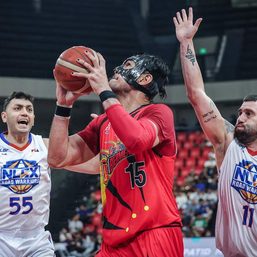
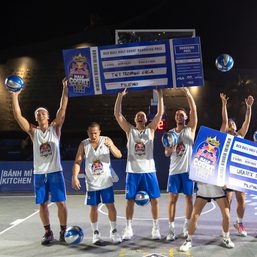
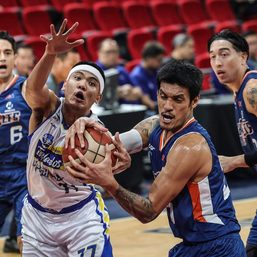
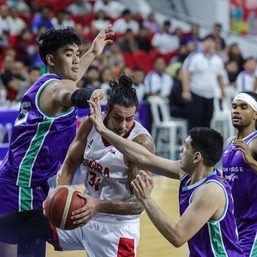
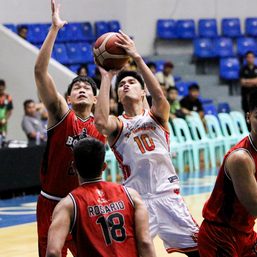
There are no comments yet. Add your comment to start the conversation.